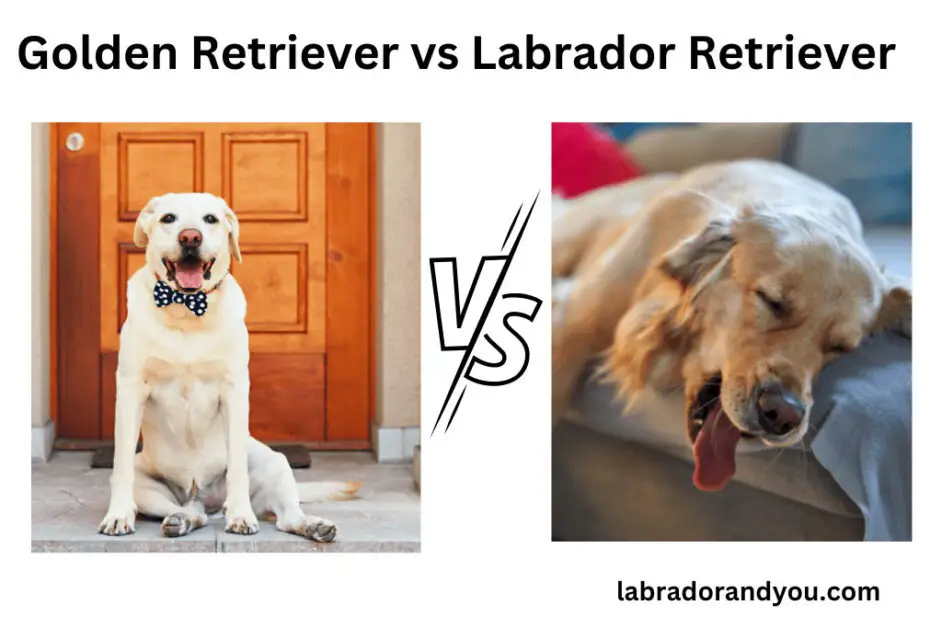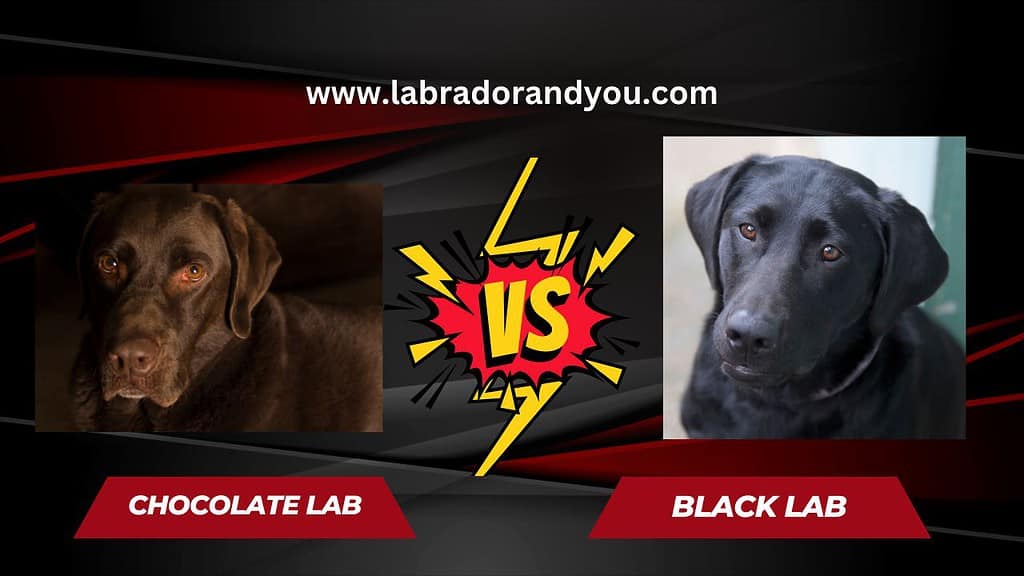Poodles are known for their curly, hypoallergenic coat, while Labradors are for their short, thick, water-resistant coat. Today, we’ll compare these two dog breeds: poodle vs labrador.
A poodle is more intelligent and trainable than a Labrador Retriever, making it a great service dog. Labs make great family pets. Poodles come in various sizes, including toy, miniature, and standard, while Labradors are a medium to large-sized breed.

Physical Characteristics And Personality Traits
Poodles are small and have more reserved personalities, while the Labrador Retriever is larger and outgoing.
Labrador and standard poodle size comparison
Here is a side-by-side comparison of their physical attributes:
| Characteristic | Poodle | Labrador Retriever |
| Size | Toy, Miniature, and Standard varieties available, ranging from 6-70 pounds | Generally larger than Poodles, with males weighing 65-80 pounds and females weighing 55-70 pounds |
| Height | Toy: 10 inches or under, Miniature: 11-15 inches, Standard: over 15 inches up to 22 inches | Males: 22.5-24.5 inches, Females: 21.5-23.5 inches |
| Build | Elegant, slender, and refined | Muscular, sturdy, and athletic |
| Coat Type | Curly and profuse (hypoallergenic) | Short and dense |
| Coat Color | Solid colors, including white, black, apricot, silver, and more | Black, yellow, or chocolate |
| Eyes | Almond-shaped and dark | Medium-sized and expressive, ranging from brown to hazel |
| Tail | Straight and set high | Thick at the base, gradually tapering towards the tip |
Coat Type And Grooming
One of the key differences between Poodles and Labradors is their coat types. It directly affects their grooming requirements.
| Breed | Coat Type | Grooming Requirements |
| Poodle | Curly and profuse coat | Frequent grooming visits are necessary to maintain the Poodle’s coat, as it is prone to matting and tangling. |
| Labrador Retriever | Short and dense coat | Labradors require moderate grooming to keep their coat healthy and minimize shedding. Their shorter coat may be easier for some pet owners to maintain. |
Temperament And Energy Level
Poodles are known for their intelligence, confidence, and alertness. They are reserved with strangers but affectionate with their families. They make awesome companion dogs.
Labrador Retrievers are friendly dogs. They are energetic, playful, and loyal companions requiring adequate exercise. Labrador Retrievers require more physical activity due to their high energy levels.
Exercise And Lifestyle Needs
Poodle Temperament: Need For Mental Stimulation
Poodles are known for being highly intelligent dogs that thrive on mental stimulation. They require regular exercise to keep their minds engaged. Poodles can develop destructive behaviors like chewing furniture or digging holes if bored.
Pet parents should consider interactive toys, puzzle games, and agility exercises to provide adequate mental stimulation. All Poodle varieties need mental engagement – Standard, Miniature, or Toy Poodle.
Labrador’s Need For Physical Activity
Labrador Retrievers are a highly active breed. Provide them with vigorous playtime, running, and other activities. Labrador Retrievers are ideal for pet owners who enjoy outdoor adventures like hiking or long walks.
These dogs can quickly become frustrated and suffer from separation anxiety without adequate exercise. Whether playing Frisbee at the park or hiking in nature, keep your canine companion engaged and entertained!
Trainability
Poodle’s High Trainability
The Poodle is highly trainable and one of the smartest dog breeds. They are very receptive to training as quick learners excelling at obedience training.
Due to their trainability, Poodles make excellent therapy and service dogs. Poodle owners describe their pets as highly responsive during training sessions.
Whether basic commands or advanced tricks, Poodles pick up new skills quickly. They respond well to positive reinforcement.
Labrador’s Intelligence And Ease Of Training
Due to their high intelligence, training a labrador is one of the easiest. They have exceptional learning abilities.
This intelligence makes a labrador retriever well-suited for a service dog role and therapy dog. They also perform well in canine sports like flyball, agility, and dock diving.
Their nature also extends to their behavior around children, making them ideal family pets. However, proper socialization is essential to ensure a friendly temperament.
Health Problems
Both poodles and labs are prone to specific health issues. However, a labrador retriever is more prone to genetic issues than a poodle.
Poodle Health Problems
Pet parents, free from genetic issues, will produce healthy pups. Ensure your breeder screens your pup or its parents to reduce the risk. The below tests are crucial for poodles.
- Hip Dysplasia
- Arthritis
- Eye Examination
- Patellar Luxation
- Progressive Retinal Atrophy
- Optic nerve hypoplasia
- Von Willebrand’s disease
Labrador Health Problems
To reduce the chances of producing genetically defective puppies, ensure your labrador retriever undergoes these tests.
- Eye Examination
- Elbow Dysplasia
- Hip Dysplasia
- Exercise Induced Collapse
- D Locus DNA Test
- Cardiac Evaluation
Similarities Between Labrador Retriever and Standard Poodle
- Both Labrador retriever breed and poodle belong to the purebred category.
- Both breeds reflect high intelligence due to their hunting and retrieving habits.
- These popular breeds need regular exercise to burn excess energy.
- Labrador retriever and poodle temperament can be described as friendly.
- Poodle labrador retriever breeds are adaptable and can live in any environment.
- Labrador retriever poodle dog breeds are family pets. They get along with children and strangers too.
Differences: Poodle vs labrador retriever dog breed.
The average lifespan of a labrador retriever is about 10-12 years. For a poodle more suited for apartment living, the lifespan is about 12-15 years.

Poodle vs Labrador Puppy Prices
The price of a standard poodle range between $ 1400 and $ 2500. The average Price is $ 1980. The price can be as low as $ 200 and as high as $ 15000.
- The average price of a Miniature Poodle – $ 2500
- Average Price of Toy Poodle – $ 2760
The average price of a labrador retriever is $ 1290. It usually ranges between $ 850 and $ 1500. Poodles are usually more expensive.
The actual price depends on the purchase method – reputable breeders, adoption centers, and puppy mills.
Choosing The Right Breed
Consider factors like your lifestyle, outdoor activities you enjoy, and indoor and outdoor space. Go for a breed that suits your personality.
Who Should Get A Labrador Retriever
A labrador retriever prefers a home with a backyard. Owners with a similar house can get a lab. However, it’s not like apartment owners cannot get them. They can but must ensure adequate physical and mental stimulation. A labrador retriever can tolerate cold weather. Get ready for regular brushing as well.
Keep a check on their daily walks, exercise needs, and playtime. A family with children can get these companion dogs. They are good for both novice owners and experienced dog owners.

Who Should Get A Poodle
The social and pleasing nature of standard poodles makes them stand out. Owners with kids can consider getting a poodle. They bond well with strangers too.
Poodles adapt to any environment and are quite learners. The breed is also travel-friendly compared to other dogs. Miniature poodles and Toy poodles are good for apartment living.

Common Misconceptions
Many people have misconceptions about Poodles and Labrador Retrievers. Here are some of the most common ones:
- Poodles are only for show: While it’s true that Poodles are often seen in dog shows, they are also great family pets.
- Labrador Retrievers are always hyperactive: Labs are known for their high energy levels and love for physical activity. They can also be calm and well-behaved when trained properly.
- Poodles are delicate: Despite their elegant appearance, Poodles are robust and athletic dogs that thrive on exercise.
- Labrador Retrievers make great watchdogs: Labs may bark to alert their owners of strangers. They generally do not have the protective instincts of other breeds, such as German Shepherds or Rottweilers.
- Poodles have a “sissy” Personality: Contrary to popular belief, Poodles have a confident and assertive nature that makes them excellent watchdogs.
- Labrador Retrievers do not always get along with cats: Labs might instinctively chase after small animals like cats or rabbits. With proper training and socialization, they can coexist with feline companions peacefully.
Final Thoughts And Recommendations.
The Poodle may be an excellent choice if you’re looking for a smaller dog with minimal shedding and hypoallergenic qualities.
The Labrador Retriever is ideal if you’re seeking a larger and more active breed that loves to retrieve and play outdoors.
Each breed has unique health concerns that should be considered before deciding. Researching breeds’ characteristics and traits will help decide which canine companion suits your lifestyle best.

FAQs
Is Poodle the smartest dog breed?
Poodles are among the smartest dog breeds. They are often employed as assistants, guides, and therapy dogs. Their keen noses make them utilized as truffle hunters.
Are Labradoodles calmer than Labradors?
Labradoodles are less calm in the Labrador Retriever comparison. They can sometimes be too possessive due to their strong bonding personalities.
Are Labradoodles more like labrador Retrievers or Poodles?
First-generation Labradoodles were a 50:50 mix between a poodle and labrador DNA. After years of breeding, Australian Labradoodles have resulted in complete poodle DNA.
Are Labs the friendliest dogs?
Labrador retriever is one of the most playful and loving dog breeds. It has been consistently ranked as America’s favorite breed per American Kennel Club. They are energetic, children-friendly, and perfect family pets.
Are Labs high maintenance?
Labrador retriever shedding can sometimes be too much. Their water-proof double coat is resistant to cold weather and offers several benefits. Keeping their coats well-maintained is crucial during the shedding season. Despite the shedding, they are some of the most low-maintenance dogs.
Author Profile
- Site Owner And Dog Lover
-
Aritra, the founder of Labradorandyou.com, is a lifelong dog lover whose passion ignited for Labradors for their loyalty and intelligence. With extensive research and personal experiences, Aritra has become a Labrador expert, offering a rich resource on the breed. Labradorandyou.com provides reliable, timely, and evidence-based information, including Labrador-specific product reviews, training techniques, and care tips.
Labradorandyou.com was born out of Aritra's passion and his desire to share his profound knowledge about the breed. The site serves as a comprehensive resource, offering a wealth of up-to-date information for Labrador owners and enthusiasts alike
Also by the author
-
 Lab-TypesNovember 17, 2023Old Dog Seizures: Causes, Symptoms, and Treatment Options
Lab-TypesNovember 17, 2023Old Dog Seizures: Causes, Symptoms, and Treatment Options
-
 Lab-TypesNovember 17, 2023Why Is My Dogs Poop Yellow? 8 Reasons & Solutions
Lab-TypesNovember 17, 2023Why Is My Dogs Poop Yellow? 8 Reasons & Solutions
-
 ReviewsNovember 17, 2023The Only Hill’s Science Diet Review You Need To Read
ReviewsNovember 17, 2023The Only Hill’s Science Diet Review You Need To Read
-
 Lab-TypesNovember 17, 2023How To Adopt An Emotional Support Dog?
Lab-TypesNovember 17, 2023How To Adopt An Emotional Support Dog?





